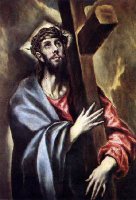
The time of the Passover in Jerusalem under Roman occupation was a tense and dangerous time because this Jewish holyday was in observance of the Jews' deliverance by their God from an oppressor centuries before. The Jews never accepted Roman occupation because they were a proud people who had established their own kingdom on land given to them by God. The Roman authorities were ready to take swift action if any sign of a disturbance took place. Troops were on alert and ready to act swiftly.
Crossan considers three events: first --- Jesus' "antitriumphal" entrance into Jerusalem. Jesus' entrance into Jerusalem is mentioned by both Mark and Matthew and points back to Zechariah 9:9. Crossan believes that this entrance did not take place as described but was, basically, an invention which fulfilled a much earlier "prophecy".
As for the Last Supper, Mark says it took place the night befoe Passover Eve, while John says the meal took place on Passover Eve itself.
Crossan doubts that this meal was meant to institutionalize a supper representing in a symbolic way Jesus' coming Passion and death on the cross, much less that the separation of bread and wine at this meal indicated the coming separation of Jesus' body and blood at Golgatha.
Neither the Gospel of Thomas, nor the Q Gospel make any mention of this institution.
And more significantly, this institutionalized, symbolic supper is not mentioned in the Didache, which is a catechetical, liturgical and disciplinary manual for Christians whose earliest sections go back between 50-70 CE (AD).
The account in John also does not speak to such an institution.
Crossan: "What Jesus created and left behind was the tradition of open commensallity* seen so often earlier, and what happened was that after his death, certain Christian groups created the Last Supper as a ritual that combined that commensality from his life with a commemoration of his death. It spread to other Christian groups only slowly. It cannot be used as a historical event to explain anything about Jesus' own death."
The third event before the Passion and death of Jesus considered by Crossan is the Temple Cleansing.
We know more about this than the Triumphal Entry, and the "Last Supper," because it is mentioned in the Gospel of Thomas 71, in Mark 11:15-19 and in John 2: 14-17.
Crossan believes that it is extremely unlikely that poor Galilean peasants frequently went to the Jewish feast days in Jerusalem. Probably very seldom; some not at all.
"I think it quite possible that Jesus went to Jerusalem only once and that the spiritual and economic egalitarianism he preached in Galilee exploded in indignation at the Temple as the seat and symbol of all that was nonegalitarian, patronal and even oppressive on both the religious and the political level."
The actions of Jesus at the Temple would almost certainly have not have been tolerated in Jerusalem at the tense time period of Passover. This was not rural Galilee. And, as would be expected, soldiers moved in quickly to arrest Jesus.
*open commensality is Crossan's term for Jesus's communal meals which included the widest variety of people in caste, wealth, and, especially included the rejected and the poor. These meals, along with Jesus' radical egalitarianism, and his healing work were the three chief marks of Jesus' ministry --- according to John Dominic Crossan.

